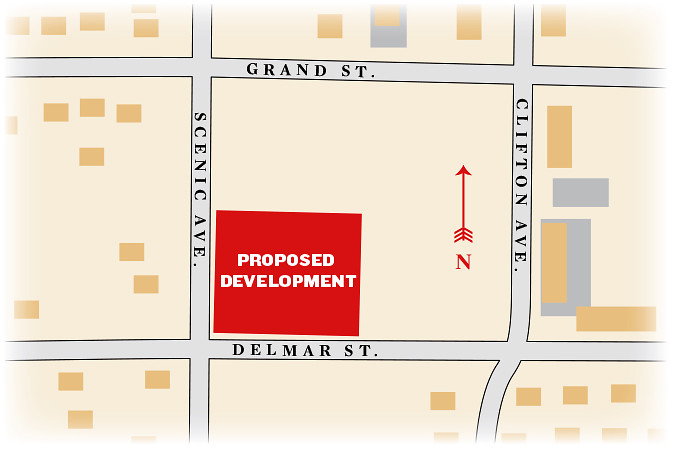YOUR BUSINESS AUTHORITY
Springfield, MO
YOUR BUSINESS AUTHORITY
Springfield, MO

Harmony House is partnering with Springfield developer The Vecino Group to build a 46-unit affordable-housing complex at the corner of South Scenic Avenue and West Delmar Street for those leaving the nonprofit’s domestic violence shelter.
On July 27, Springfield City Council considered a bill to rezone the planned development at 1042 S. Scenic Ave. and allow the housing plans.
Harmony House Executive Director Lisa Farmer said many women need housing assistance when they leave the nonprofit’s 519 E. Cherry St. shelter.
“Harmony House is designed to be a 90- to 120-day temporary shelter. We take the women and children in. We handle the immediate crisis situation. We stabilize them. We help them begin the healing process. But at the end of 90 to 120 days, they need to find independent living,” Farmer told council during the public hearing. “That is one of the greatest obstacles we face – finding affordable, safe, secure housing for these families.”
Dubbed the Angelou Apartments, the complex would create 10 one-bedroom apartments and 36 two- and three-bedroom units, as well as several security features, including privacy gates, access codes, and a secure parking lot and entrances.
Organized under Family Violence Center Inc., the Harmony House shelter typically runs at capacity, which Farmer said is 110 women and children.
“It won’t give us any more room at the shelter, but what it will do is give us a full continuum of care, so that we will be able to hopefully move people through the shelter more quickly and free up more beds,” she said.
Last year, Farmer said the shelter turned away over 2,300 individuals, up from roughly 500 in 2010.
Stacy Jurado-Miller, developer of special needs and supportive housing for Vecino Group, said a Harmony House awareness event she participated in last year led to the partnership talks. Following a tour of the Cherry Street shelter, Jurado-Miller said she knew low-income housing tax credits could be used to help meet the organization’s needs. The Vecino Group utilized the tax credits in its financing for the $9.7 million redevelopment of the Landmark building.
“There was a 9-year-old boy whose hair had fallen out in patches due to stress, women and children living in rooms no bigger than jail cells, and every inch of space was overflowing,” Jurado-Miller said via email.
“Nobody could see Harmony House and not want to help in the expansion.”
In the partnership, Vecino Group would serve as developer and minority owner, while majority owner Harmony House would manage the complex.
To fund the multimillion-dollar apartments, officials plan to rely solely on sales proceeds of low-income housing tax credits, which have yet to be secured through the Missouri Housing Development Commission. Applications are due in mid-September, and approvals are expected in December.
With state and city approvals, Farmer said construction could begin early next year.
Additionally, a capital campaign is underway to increase the number of beds at the shelter.
Farmer said the nonprofit plans to roll out details in September, but it’s considering the purchase of a building that would grow the bed count to 160.
Springfield Planning & Development Director Mary Lilly Smith said rezoning the 1.78-acre lot in west Springfield would restrict use to housing for targeted populations, including domestic-violence victims, seniors and veterans. Family Violence Center already owns the land, according to Greene County assessor records.
“This project was awarded additional dwelling units over what we’d typically allow on this site because it’s using green-building construction and because it is an affordable housing project,” she said. “It also would have a number of amenities – a fitness room, playground and a garden.”
Council is slated to vote on the Angelou Apartments proposal Aug. 10. The Planning & Zoning Commission and city staff recommend approval.
Loan language
A pair of measures from council’s consent agenda might trigger changes in two city loan programs.
One ordinance would change the name of the Small Business Development Loan Program to the Commercial Loan Program and expand its footprint citywide, and the other would adjust loan terms for the Brownfields Program Revolving Loan Fund. Smith said the moves are designed to spur interest from potential borrowers.
Capitalized by the federal Community Development Block Program to remove blight and further U.S. Housing and Urban Development projects, the Small Business Development Loan Program has issued 225 loans exceeding $30 million since 1984. Smith said $3.5 million in lending income is still available in the center city-focused program, and a name change would better define the program.
“Some of the projects that we fund are not small business,” Smith said.
The brownfields fund, which was established in 2009 via a $1 million Environmental Protection Agency grant to support cleanup loans for businesses, has netted two loans and five subgrants to date. The program, which was recapitalized, has about $1 million available to loan. Smith said lower interest rates and adjusting terms could make the program more effective.
According to information provided to council, 13 qualified borrowers decided not to use the program after going through the application process and learning about the policies and requirements involved.
Currently, loans carry no interest the first two years; 3 percent between two and five years; and 6 percent interest between five years and 10 years. The proposal would extend the no-interest terms to five years; 2 percent between years five and 10; and 3 percent from 10 to 15 years.
Council is scheduled to vote on the ordinances Aug. 10.
Missouri State University’s science building, built in 1971 and formerly called Temple Hall, is being reconstructed and updated.